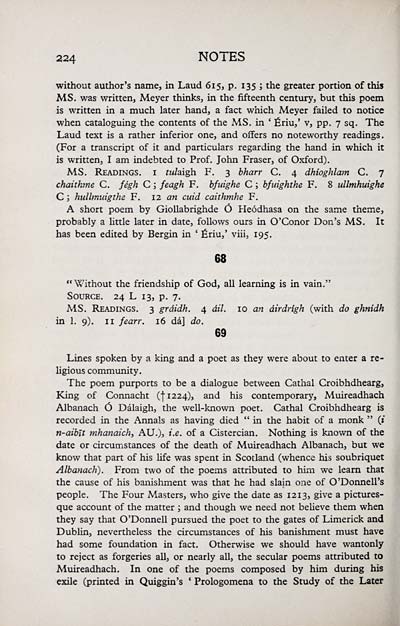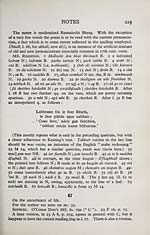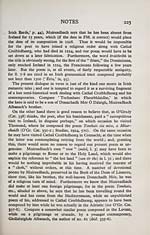Matheson Collection > Measgra dánta
(244)
Download files
Complete book:
Individual page:
Thumbnail gallery: Grid view | List view

224 NOTES
without author's name, in Laud 615, p. 135 ; the greater portion of this
MS. v/as written, Meyer thinks, in the fifteenth century, but this poem
is written in a much later hand, a fact which Meyer failed to notice
when cataloguing the contents of the MS. in ' Ériu,' v, pp. 7 sq. The
Laud text is a rather inferior one, and offers no noteworthy readings.
(For a transcript of it and particulars regarding the hand in which it
is written, I am indebted to Prof. John Fraser, of Oxford).
MS. Readings, i tulaigh F. 3 bharr C. 4 dhioghlam C. 7
chaithne C. fégh C ; feagh F. hfuighe C ; bfuighthe F. 8 ullmhtdghe
C ; huUmuigthe F. 12 an cuid caithmhe F.
A short poem by GioUabrighde Ó Heódhasa on the same theme,
probably a Httle later in date, follows ours in O'Conor Don's MS. It
has been edited by Bergin in ' Ériu,' viii, 195.
68
"Without the friendship of God, all learning is in vain."
Source. 24 L 13, p. 7.
MS. Readings. 3 gráidh. 4 ail. 10 an áirdrigh (with do ghnidk
in 1. 9). II fearr. 16 da] do.
69
Lines spoken by a king and a poet as they were about to enter a re-
hgious commvmity.
The poem purports to be a dialogue between Cathal Croibhdhearg,
King of Connacht ("|"I224), and his contemporary, Muireadhach
Albanach Ó Dálaigh, the well-known poet. Cathal Croibhdhearg is
recorded in the Annals as having died "in the habit of a monk " (t
n-aiblt tnhanaich, AU.), i.e. of a Cistercian. Nothing is known of the
date or circumstances of the death of Muireadhach Albanach, but we
know that part of his life was spent in Scotland (whence his soubriquet
Albanach). From two of the poems attributed to him we learn that
the cause of his banishment was that he had slain one of O'Dormell's
people. The Four Masters, who give the date as 1213, give a pictures-
que account of the matter ; and though we need not beheve them when
they say that O'Dormell pursued the poet to the gates of Limerick and
Dublin, nevertheless the circumstances of his banishment must have
had some foundation in fact. Otherwise we should have wantonly
to reject as forgeries all, or nearly all, the secular poems attributed to
Muireadhach. In one of the poems composed by him during his
exile (printed in Quiggin's ' Prologomena to the Study of the Later
without author's name, in Laud 615, p. 135 ; the greater portion of this
MS. v/as written, Meyer thinks, in the fifteenth century, but this poem
is written in a much later hand, a fact which Meyer failed to notice
when cataloguing the contents of the MS. in ' Ériu,' v, pp. 7 sq. The
Laud text is a rather inferior one, and offers no noteworthy readings.
(For a transcript of it and particulars regarding the hand in which it
is written, I am indebted to Prof. John Fraser, of Oxford).
MS. Readings, i tulaigh F. 3 bharr C. 4 dhioghlam C. 7
chaithne C. fégh C ; feagh F. hfuighe C ; bfuighthe F. 8 ullmhtdghe
C ; huUmuigthe F. 12 an cuid caithmhe F.
A short poem by GioUabrighde Ó Heódhasa on the same theme,
probably a Httle later in date, follows ours in O'Conor Don's MS. It
has been edited by Bergin in ' Ériu,' viii, 195.
68
"Without the friendship of God, all learning is in vain."
Source. 24 L 13, p. 7.
MS. Readings. 3 gráidh. 4 ail. 10 an áirdrigh (with do ghnidk
in 1. 9). II fearr. 16 da] do.
69
Lines spoken by a king and a poet as they were about to enter a re-
hgious commvmity.
The poem purports to be a dialogue between Cathal Croibhdhearg,
King of Connacht ("|"I224), and his contemporary, Muireadhach
Albanach Ó Dálaigh, the well-known poet. Cathal Croibhdhearg is
recorded in the Annals as having died "in the habit of a monk " (t
n-aiblt tnhanaich, AU.), i.e. of a Cistercian. Nothing is known of the
date or circumstances of the death of Muireadhach Albanach, but we
know that part of his life was spent in Scotland (whence his soubriquet
Albanach). From two of the poems attributed to him we learn that
the cause of his banishment was that he had slain one of O'Dormell's
people. The Four Masters, who give the date as 1213, give a pictures-
que account of the matter ; and though we need not beheve them when
they say that O'Dormell pursued the poet to the gates of Limerick and
Dublin, nevertheless the circumstances of his banishment must have
had some foundation in fact. Otherwise we should have wantonly
to reject as forgeries all, or nearly all, the secular poems attributed to
Muireadhach. In one of the poems composed by him during his
exile (printed in Quiggin's ' Prologomena to the Study of the Later
Set display mode to: Large image | Transcription
Images and transcriptions on this page, including medium image downloads, may be used under the Creative Commons Attribution 4.0 International Licence unless otherwise stated. ![]()
| Early Gaelic Book Collections > Matheson Collection > Measgra dánta > (244) |
|---|
| Permanent URL | https://digital.nls.uk/80519563 |
|---|
| Description | Items from a collection of 170 volumes relating to Gaelic matters. Mainly philological works in the Celtic and some non-Celtic languages. Some books extensively annotated by Angus Matheson, the first Professor of Celtic at Glasgow University. |
|---|
| Description | Selected items from five 'Special and Named Printed Collections'. Includes books in Gaelic and other Celtic languages, works about the Gaels, their languages, literature, culture and history. |
|---|

